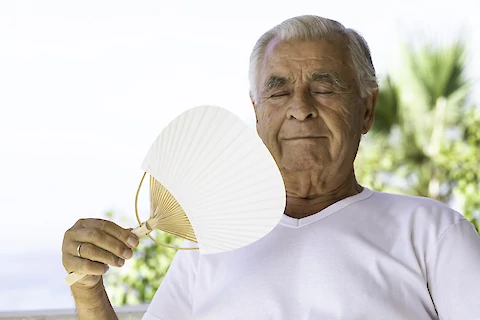
When summer arrives, we love to soak up some sun and enjoy the warm weather. However, it's important to remember that hot temperatures also increase the risk of heat stroke, especially for our senior loved ones. As adult children are concerned about their senior relatives, staying informed about heat stroke risks, identifying symptoms, and taking preventive measures are essential for their safety during these sweltering months.
This guide discusses why seniors are more susceptible to heat stroke and advises what to do if you suspect your loved one is experiencing this dangerous condition.
Why Seniors Are at Higher Risk for Heat Stroke
As we age, our bodies undergo various changes that make it more challenging to regulate temperature. This reduced ability to adapt to the heat, chronic medical conditions, and medications that affect hydration and temperature regulation increases seniors' risk of heat stroke. Living in hot climates or homes without proper air conditioning or ventilation also contributes to this increased risk.
Identifying Symptoms of Heat Stroke in Seniors
It is important to recognize the signs of heat stroke in seniors. Some common symptoms include the following:
- A high body temperature
- Rapid pulse
- Headache
- Nausea and vomiting
- Confusion or disorientation.
These symptoms might manifest differently in seniors compared to younger individuals. So, pay attention to their overall well-being.
Preventive Measures to Ensure Senior Safety During Hot Summer Months
To help protect our senior loved ones from heat stroke, Follow these preventive measures:
- Ensure adequate hydration. Encourage seniors to drink water regularly, even if they don't feel thirsty. Providing a water bottle or keeping a glass of water nearby is a helpful reminder.
- Keep cool and comfortable. Your senior family member's living space should have air conditioning or proper ventilation. Consider investing in fans or portable air conditioning units if needed. Remind them to wear lightweight, loose-fitting clothing and suggest cooling off with cold showers or baths when necessary.
- Limit exposure to extreme heat. Encourage seniors to stay indoors during peak heat hours, typically between 10 am and 4 pm, and plan any outdoor activities for cooler times of the day, such as early morning or evening. Keep track of local weather forecasts and heat advisories or warnings.
Steps to Follow if You Suspect a Loved One is Experiencing Heat Stroke
Acting quickly is crucial if you suspect your senior loved one is experiencing heat stroke.
- Call 911 immediately to report a medical emergency.
- While waiting for help, move the person to a cooler environment, such as an air-conditioned room or a shady outdoor spot.
- Cool them down by applying cold water or ice packs to their forehead, neck, underarms, and groin.
- Check their vital signs and ensure they remain conscious and alert.
- If their symptoms do not improve, seek further medical attention.
We Can Help
Understanding and preventing heat stroke in seniors is vital for their safety and well-being during the hot summer months. Staying informed, taking preventive measures, and knowing how to act in an emergency will help keep our senior loved ones safe and comfortable. Senior Helpers Greenfield provides premium senior care. If you live in Greenfield, Indianapolis, or Anderson and seek assistance for your senior loved ones, contact us for support and resources.